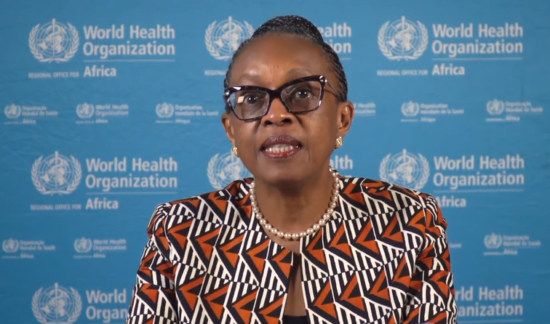Women account for a slightly smaller proportion of COVID-19 infections and deaths compared with men, a preliminary analysis by the World Health Organisation (WHO) in 28 African countries shows.

WHO Regional Office for Africa said this in a statement issued from its headquarters in Brazzaville, Congo on Thursday, March 4, 2021.
According to the statement, Dr Matshidiso Moeti, WHO Regional Director for Africa, reported the findings of the analysis at a virtual press conference on COVID-19.
Moeti said the analysis was based on COVID-19 gender specific epidemiological data provided by countries.
“The data found that although women account for around 41 per cent of COVID-19 cases, this ranges from 31 per cent in Niger to over 57 per cent in South Africa.
“In most countries, women are somewhat less likely to die from COVID-19 than men.
“For instance, in Cote d’Ivoire the case fatality ratio stands at 0.4 per cent for women compared with 0.5 per cent in men.
“In the Democratic Republic of the Congo it is 2.2 per cent versus 2.7 per cent and 0.1 per cent versus 0.5 per cent in Seychelles.
“This comes despite women accounting for a large part of the health workforce which puts them at higher risk of infection,’’ she said.
According to the statement, in Africa more than 95,000 health workers have been infected with COVID-19.
It stated that in Seychelles, women accounted for 71 per cent of health worker infections, 64 per cent in Eswatini, 55 per cent in Cote d’Ivoire and 54 per cent in Senegal.
“Further analyses are required to determine the factors behind the disparity in infections between men and women. However, some studies have suggested that biological, behavioural or social factors could be responsible.
“Other studies report that men are significantly more likely to suffer severe effects of COVID-19 and more likely to have pre-existing conditions, explaining the slightly lower fatality rate seen in women.
“However, the pandemic and the initial strict containment measures such as lockdowns, movement restriction and school closures accentuated existing vulnerabilities faced by women and girls,” Moeti stated.
The statement, however, quoted Moeti, as saying, “the aftershocks of the COVID-19 pandemic on women and girls have been profound, leaving many grappling with heightened risks to their health and safety.
“Our response must go beyond the clinical aspects of the pandemic and address the hidden crises that risk causing long-term effects to lives and livelihoods.”
With the pandemic accentuating challenges to accessing essential health services, a WHO preliminary analysis in 22 countries found 10 reported a rise in maternal deaths.
The highest increases reported in Comoros, Mali, Senegal and South Africa between February and July 2020, compared with the same period in 2019.
Nine of the 22 countries reported a decline in births in health facilities and an increase in complications due to abortions.
Studies have also found that violence against women, and particularly domestic violence, increased in several countries as security, health, and financial worries created tensions and strains which were worsened by the confined living conditions of lockdown.
The global health agency further said the economic fallout due to COVID-19 had greatly affected women.
It stated that informal workers, most of whom were women, accounted for more than 90 per cent of the labour force in sub-Saharan Africa, citing a World Bank report.
“Informal sector jobs have been particularly hit by the pandemic; WHO is working with countries to mitigate the impact of the pandemic on women’s health.
“Several countries have implemented initiatives to ensure services for sexual, reproductive, maternal, newborn, adolescent and older people’s health are maintained.
“The projects include reorganising antenatal care services and providing personal protective equipment to minimise COVID-19 infection and mobile-based family planning services.
“It also includes self-care options for oral and injectable contraceptives as well as public private partnerships to deliver contraceptives and other family planning commodities,” said WHO.
By Cecilia Ologunagba
